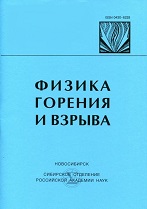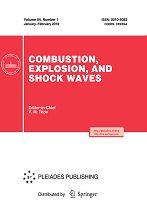|
This article is cited in 12 scientific papers (total in 12 papers)
Inhibition of various hydrogen combustion regimes in air by propylene and isopropanol
V. V. Azatyana, A. A. Borisovb, A. G. Merzhanova, V. I. Kalacheva, V. V. Masalovaa, A. E. Mailkovb, K. J. Troshinb
a Institute of Structural Macrokinetics and Problems of Materials Sciences, Russian Academy of Science, 142432, Chernogolovka
b Semenov Institute of Chemical Physics, Russian Academy of Science, 119991, Moscow
Abstract:
This paper studies the effects of small additives of propylene and isopropanol on the hydrogen-air flame speed in the predetonation regime, deflagration-to-detonation transition, and burning rate. It is shown that the difference in the effects of these additives on the combustion is determined primarily by their ability to terminate reaction chains. In hydrogen flames, the additives are consumed as a result of their reactions with the active intermediate products of H$_2$ combustion in which these species are replaced by inactive radicals.
Keywords:
inhibition, chain termination, branching, detonation, deflagration, self-heating, chain-thermal explosion.
Received: 17.12.2003
Accepted: 02.07.2004
Citation:
V. V. Azatyan, A. A. Borisov, A. G. Merzhanov, V. I. Kalachev, V. V. Masalova, A. E. Mailkov, K. J. Troshin, “Inhibition of various hydrogen combustion regimes in air by propylene and isopropanol”, Fizika Goreniya i Vzryva, 41:1 (2005), 3–14; Combustion, Explosion and Shock Waves, 41:1 (2005), 1–11
Linking options:
https://www.mathnet.ru/eng/fgv1653 https://www.mathnet.ru/eng/fgv/v41/i1/p3
|


| Statistics & downloads: |
| Abstract page: | 34 |
|





 Contact us:
Contact us: Terms of Use
Terms of Use
 Registration to the website
Registration to the website Logotypes
Logotypes







 Citation in format
Citation in format 
